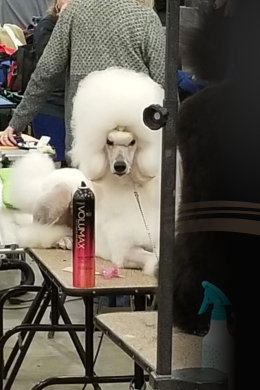






A Look Into the Future...
©David J. Arthur, January 31, 2007 Picture yourself in a back ally late at night. There’s a florescent light flickering in the distance and you shiver, not so much from the cold, as from the overbearing sense of danger for being in “that part of town.” At the other end of the ally, a non-descript sedan slowly enters, and stopping nearby, the driver lowers a tinted window an inch or so and asks, “Did you bring cash?” “Yes,” you choke hesitantly. “Good! Now, which is it gonna be? And hurry before the police get here! You want a Persian, or you want a Poodle?” In the near future this scenario won’t resemble the latest theme from a really bad spy novel. The amount and severity of pet regulation is growing by leaps and bounds and could eventually end your availability to purebred pets. The present anti-dog legislation alone betrays the beginning of a tidal wave of bad laws. Much of this was geared toward limiting dog attacks. As people produced certain breeds for fighting or guarding contraband, basic breed behaviors changed. For example, in the 1930’s and 40’s, Pit Bulls were famous for their gentle nature, something that still remains in the breed standard. But today, because of the unethical and often illegal manner in which they are used, they have become the prime target for anti-dog legislation. And legislators didn’t stop with Pitts. Rottweilers, Cane Corso, Bull Terriers, and Doberman Pinschers have all been branded as “vicious breeds” regardless of their true natures. Not just dog attacks have the government up in arms. The shelters claim pet overpopulation is all but epidemic. Thus it is easy to see why government wants to step in and ebb the tide. Ultimately these issues threaten to become a public health problem, and as a defense, many communities are restricting ownership and instituting mandatory spay/neuter laws. While intended to benefit animals and reduce public danger, they also create a very negative environment for both responsible breeders and loving pet homes. The responsible breeder or pet owner is rarely implicated in dog attacks or abandonment; however, the laws generally make no distinctions. Legislators are often not that knowledgeable about the breeds involved, or even less about dogs in general. Thus, they pass judgment without the benefit of knowing their target. Subsequently, we end up with restrictions that fall short of addressing the original intent; dictating broad and generically defined prohibitions. So, where does a good legislator turn to become educated? Go to the experts, right? Enter “the man behind the curtain”, in the form of what are commonly referred to as animal rights groups. Most people aren’t aware that organizations such as the Doris Day Foundation and PETA hold a clearly stated agenda to end pet breeding. Even the Humane Society of the U.S. (HSUS) — seen by the public as the patron saint of animal protection — is actively working to institute greater and more draconian restrictions such as mandatory spay/neuter laws. Well funded and fanatically led, these groups use the present legislative climate toward their own end, with some, such as the Animal Liberation Front working to end pet ownership altogether. Bureaucrats often miss their aim, and in anti-breed or pet legislation, their actions take down the very people who are best suited to fix the problem, the reputable breeder and responsible owner. By listening to the animal rights contingent, government becomes deaf to those who have the experience and concern to create real solutions instead of expedient political fixes. And the more the politics flow, the more entrenched become the animal rights advocates. It is only a matter of time before the ethical breeder disappears, and the only outlets for getting a well-bred pet is the pet stores fed by puppy mills - or through the black market. Worse yet, these laws have no real effect on reducing shelter turn-ins. This issue is related to pet ownership and not production. The irresponsible either have no regard for rules or are simply negligent in altering their pets. So regardless of what fines are levied or what registrations you pass, won’t likely obey the law anyway. Commercial production usually happens out of state where local laws don’t apply. Shipped to pet stores, commercial breeders sell nearly a half-million dogs a year (1) with little guarantee of quality or good health. Tack on a price of around $600 per puppy, this industry brings in well over $300 million annually. They will simply pay the fees and continue to operate, producing substandard pets coming from deplorable conditions. Because this is big business, no politician will ever address problems associated with the industry, and even some registries overlook their actions in order to obtain the revenue registrations generate. “Hobby” or show breeders generally make just enough on a litter to cover their costs in creating it ... if they’re lucky! Reputable breeders perform a myriad of genetic and health tests to ensure their animals are of the highest quality. In dogs, they generally produce no more than one or two breeds and are extremely careful in selecting the best homes for their litters. They are usually a member of a local club, show their animals on a regular basis to validate quality, and often spend more money on a purebred litter than they will ever see in proceeds. They are not the problem that organizations such as the HSUS make them out to be. Yet they are the ones that anti-dog laws target! And so, you the consumer suffer the loss of your right to purchase and raise your choice of healthy and disease-free pet. As these laws proliferate, the number of reputable breeders will decline, and all that remains are the commercial breeders who view pet production as a business without regard to quality and breed improvement. Some breeds will be banned, and when you consider that many are not the monsters of which they are made out to be, it is a travesty that noble dogs, such as the Dogo Argentino will go by the wayside, consigned to extinction because of the haphazard policies of those who place political gain ahead of true public service. So what do we do? For show enthusiasts, exhibiting in communities where our animals are not fully welcome works against the future of our sport. To simply stand aside and trust that someone else will take up the cause is a sure-fire way to ensure our side of the issue is never heard. If nothing else, you should become aware of the legislation around you, and then put that knowledge to use in the ballot box. Politics is all about public opinion, and a silent constituency is one that will be ignored. There is no place for inaction, and we must make it known that our votes do count, lest we may one day find ourselves in that back alley, holding a clandestine meeting just for the sake of owning a canine companion. 1. This statistic was produced by the Humane Society of the U.S. as justification for their lobbying efforts.



















